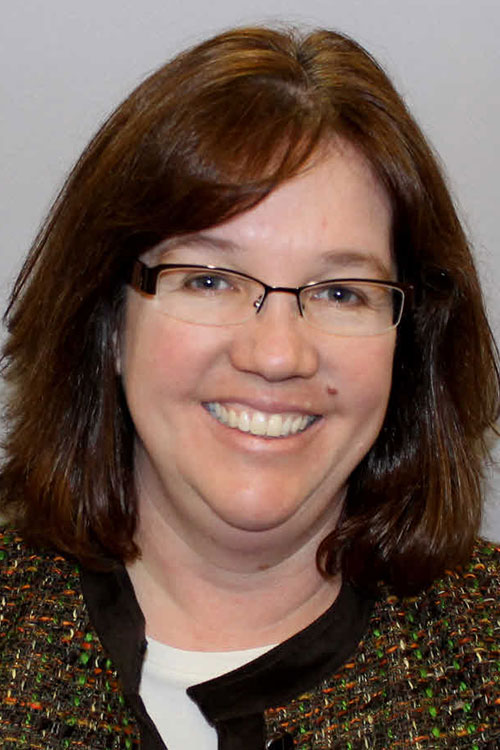- K-State home
- College of Veterinary Medicine
- Academics
- Diagnostic Medicine/Pathobiology
- Faculty and Staff
- Faculty
- Dr. Dana Vanlandingham
Dana L. Vanlandingham, Ph.D., M.S., F.R.E.S.
Professor, Arbovirology 
Ph.D., Liverpool School of Tropical Medicine, Liverpool UK
M.S., Colorado State University
B.S., Colorado State University
Office: 1041 Pat Roberts Hall
Phone: 785-532-1333
Email
My research is focused on zoonotic arboviruses most of which require high containment facilities. Some current projects are:
1) Development of Countermeasures for a Japanese Encephalitis Introduction in the United States. Japanese encephalitis virus (JEV) is a mosquito-borne zoonotic flavivirus that can cause fatal infections in animals and humans. The purpose of this project is to develop novel vaccines and therapeutics which could be used in case of an introduction of this virus into the U.S.
2) Biology of Mosquito Vectors of Arbovirus Transmission Associated with Emerging Disease Threats of Livestock. The purpose of this project is to facilitate research to enhance the understanding of arbovirus maintenance, transmission, and infection/disease in mosquitoes, swine, and sheep. The overall goals of this research program is to understand how arboviruses adapt to insect and animal hosts and how this knowledge can be used to break the cycle of transmission and to develop better countermeasures to prevent the transmission of zoonotic diseases to human hosts.
3) Control of Emerging Bunyaviruses. Arboviruses in the family of Bunyaviridae utilize a wide range of arthropod vectors, e.g. mosquitoes, midges, or ticks to transmit pathogens that have a high impact on human and veterinary public health. The overall goal of this project is to establish and evaluate a vaccine platform for the rapid generation of new vaccines to protect livestock against emerging bunyaviruses.
I am very active in teaching graduate students and veterinary students. I am the coordinator and team-teach VDMP831 Veterinary Virology to second year DVM students. I have developed courses focused on High Containment Transboundary Animal Disease (TAD) research (DMP690, 691, 846, 893, 895, and 995). We also have an active training program: USDA APHIS sponsored program titled “NBAF Laboratorian Training Program”, aimed at teaching future diagnosticians to support veterinary diagnostic laboratories. We have previously conducted an International training program titled “High Containment Laboratory Practices and Techniques Course” sponsored by USDA APHIS aimed at supporting leaders of non-U.S. high containment laboratories and presented the first week of the CEEZAD BSL-3 Training TAD Summer Program.
NBAF Laboratorian Training Program
Our agreement with the USDA APHIS is designed to build technical skills and expertise to fill the workforce needs of the Foreign Animal Disease Diagnostic Laboratory (FADDL) at the new National Bio and Agro-defense Facility (NBAF) in Manhattan, KS and the National Veterinary Services Laboratories (NVSL) in Ames, IA. This training program will help address the critical need for a skilled technical workforce that will be required when NBAF opens.
Courses Taught
DMP690 Essential Practices for BSL-3 (1 credit)
DMP691 Introduction to High Containment Research Topics and Techniques (3 credits)
DMP846 Foundations in Biosecurity (2 credits)
DMP846ZA Foundations in Biosecurity (3 credits)
DMP893 Principles of Biosafety and Biocontainment (3 credits)
DMP822 Veterinary Virology (3 credits, 6 lectures)
VDMP851 Veterinary Virology (3 credits, 6 lectures) (Spring 2022) Interim Course Coordinator
VDMP831 Veterinary Virology (3 credits) Course Coordinator
DMP813 Select Agent Studies (3 credits)
DMP895-A Transboundary Animal Diseases (3 credits) DMP910 Pathogenic Mechanisms of Viruses
DMP910 Pathogenic Mechanisms of Viruses
Director - BRI high containment insectary (ACL-3) and the ACL-1 laboratory
Service on K-State Committees:
University -
Kansas State University (KSU) Graduate School Sarachek Award Selection Committee (2021, 2022)
KSU Office of the Vice President for Research (OVPR) Economic Prosperity Plan Implementation Working Group (2022)
KSU OVPR Biosecurity and Biodefense Working Group 3 (2022)
KSU Higher Learning Commission (HLC) Accreditation Review Visit Invited Member (April 2022)
KSU OVPR Project Life (2021-2022)
KSU Faculty Senate University Library Committee (2019-2022)
KSU Graduate Council Member (2017-2022)
KSU Graduate Council Academic Affairs Committee Co-Chair (2021-2022)
KSU Graduate Council Academic Affairs Committee Chair (2019-2020)
KSU Academic Affairs Committee Member (2017-2022)
KSU IBC Committee Member (2013-present)
College -
KSU College of Veterinary Medicine (CVM) Student and Faculty Affairs Committee (2022- present)
KSU CVM Admissions Committee Member (2022-present)
KSU CVM Faculty Council Member (2020-present)
KSU CVM Faculty Council Secretary (2021-2022)
KSU CVM Promotion and Tenure Committee (2020-present)
KSU CEEZAD Training Selection Committee (2015-present)
KSU Reappointment Advisory Committee, Associate Dean for Research Member (2016)
Department -
KSU CVM DMP Space Committee Member (2019-present)
KSU CVM DMP Document Review Task Force Committee Member (2019-present)
KSU CVM Diagnostic Laboratory Molecular Veterinary Virologist Search Committee Member (2016)
Other -
Australian Commonwealth Scientific and Industrial Research Organisation Risk Assessment for Genetic Biocontrol (2022)
KSU Biosecurity Research Institute Representative for RAV3N Training and Workforce Development Working Group at Texas A&M (2021-present)
Fellow, Royal Entomological Society of London
Fellow, Marty Vanier and Bob Krause Biosecurity Research Institute Research Fellow
Kansas State University Academy of Fellows
Zoetis Research Award: Excellence in Research by a Faculty Member, College of Veterinary Medicine
Scientific Reports Journal Top 100 Most Downloaded Articles from 2020 for “SARS-CoV-2 failure to infect or replicate in mosquitoes: an extreme challenge” (Article Rank of 47)
Received the 2021 BIAL Award in Biomedicine for our research entitled: “Zika virus protection by a single low dose nucleoside modified mRNA vaccination” (Nature, 2017)
Women of Distinction Recognition Ceremony, Kansas State University